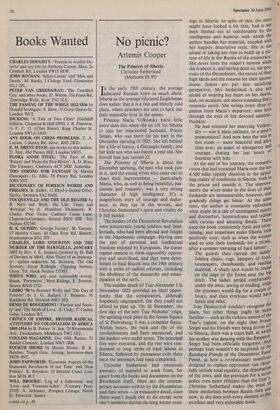No picnic?
Artemis Cooper
The Princess of Siberia Christine Sutherland (Methuen £8.95)
Tn the early 19th century, the average leducated Russian knew as much about Siberia as the average educated Englishman does today: that it is a vast and bitterly cold place, where prisoners are sent to hack out their miserable lives in the mines.
Princess Maria Volkonsky knew little more than this when she set off for Siberia to join her imprisoned husband, Prince Sergei, who was there for his part in the December uprising of 1825. She left behind her a life of luxury, a distraught family, and her little son who was barely a year old. She herself had just turned 22.
The Princess of Siberia is about the December uprising, the men who took part in it, and the young wives who came out to share their imprisonment ,— particularly Maria, who, as well as beindbeautiful, pas- sionate and romantic, was a very strong character of high intelligence. It's a magnificent story of courage and endur- ance, as they say in the movies, and Christine Sutherland's spirit and vitality do it full justice.
The leaders of the Decembrist Revolution were aristocratic young soldiers and intel- lectuals, who had been abroad and fought in the Napoleonic campaign. Having seen the sort of personal and intellectual freedom enjoyed by Europeans, the tsarist regime seemed to them impossibly oppres- sive and uncivilised, and they were deter- mined to haul Russia into the 19th century with a series of radical reforms, including the abolition of the monarchy and eman- cipation of the serfs.
The sudden death of Tsar Alexander I in November 1825 provided an ideal oppor- tunity that the conspirators, although hopelessly unprepared, felt they could not afford to pass up. On 16 December, the first day of the new Tsar Nicholas' reign, the uprising took place in the Senate Square of St Petersburg; it was a complete fiasco. Within hours, the rank and file of the revolutionaries had been massacred, and the leaders were under arrest. The principal five were executed, and the rest were con- demned to long terms of hard labour in Siberia, followed by permanent exile there once the sentences had been completed.
Christine Sutherland had enormous amounts of material to work from, for apart from the books and documents on the Revolution itself, there are the contem- porary accounts written by the Decembrists and their wives — in exhaustive detail, since there wasn't much else to do except write one's memoirs during the long winter even-
ings in Siberia. In spite of this, the story might have looked a bit thin, had it not been fleshed out so comfortably by the intelligence and humour with which the author handles her material, coupled with her happily descriptive style. She is not afraid of taking her time to build up a pic- ture of life in the Russia of the aristocracY. She never loses the reader's interest while she is about it, and having done so, her por- traits of the Decembrists, the nature of their high ideals and the reasons for their ignom- inious failure are put into satisfying perspective. Mrs Sutherland is also not afraid of wearing her heart on her sleeve, and, on occasion, not above sounding like a romantic novel. She wrings every drop of pathos from Maria's departure, seen here through the eyes of her devoted admirer, Pushkin: He had resented her marrying Volkon- sky — was it plain jealousy, or a poet's premonition? And now here she was in this room — more beautiful and alive than ever, an angel of abnegation and courage, sharing her last hours of freedom with him. At the end of her journey, the romantic vision that had sustained Maria over the last 4,500 miles rapidly dissolves in the appal" ling reality of conditions in Siberia, both in the prison and outside it. The improve- ments the wives make in the lives of their husbands are immeasurable, however, and gradually things get better. At the same time, the author is constantly enlivening what might be a tale of unmitigated misery and discomfort, homesickness and tedium with curious and amusing details. These keep the book consistently fresh and enter- taining, and sometimes make Siberia look positively cosy, such as when the woolen used to join their husbands for a Picnic' after a summer morning of hard labour: ,
The guards then carried the ladies
folding chairs, rugs, hampers of food,
newspapers, chessboards, and reading material. A shady spot would be found
on the edge of the forest near the big
ditch. The ladies settled comfortably
under the trees, sewing or reading, while,.
the prisoners would dig for a couple ol
hours, and then everyone would have
lunch and relax.
Ivan Denisovitch wouldn't recognise the place, but other things might be more familiar — such as the ruthless nature of the Tsar's regime: on the night that Prole:, Sergei and his friends were being driven off to Siberia, there was a court ball, at which his mother was dancing with the Emperor' Sergei had been officially forgotten. And perhaps Ivan wouldn't be surprised, in the, Russkaya Pravda of the Decembrist Pave, Pestel, at how a revolutionary manifesto designed to replace oppression can cheer- fully include total equality, the deportation of the Jews, and the provision for a secret police even more efficient than the Tsar 5; Christine Sutherland makes the most 0,1 these similarities between Russia then an° now, as she does with every element in this excellent and very enjoyable book.














































 Previous page
Previous page